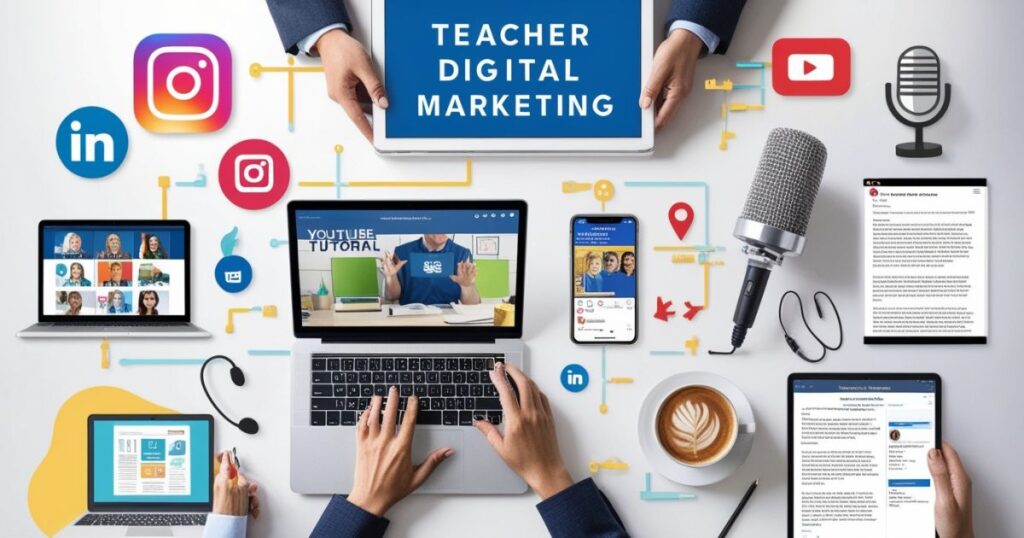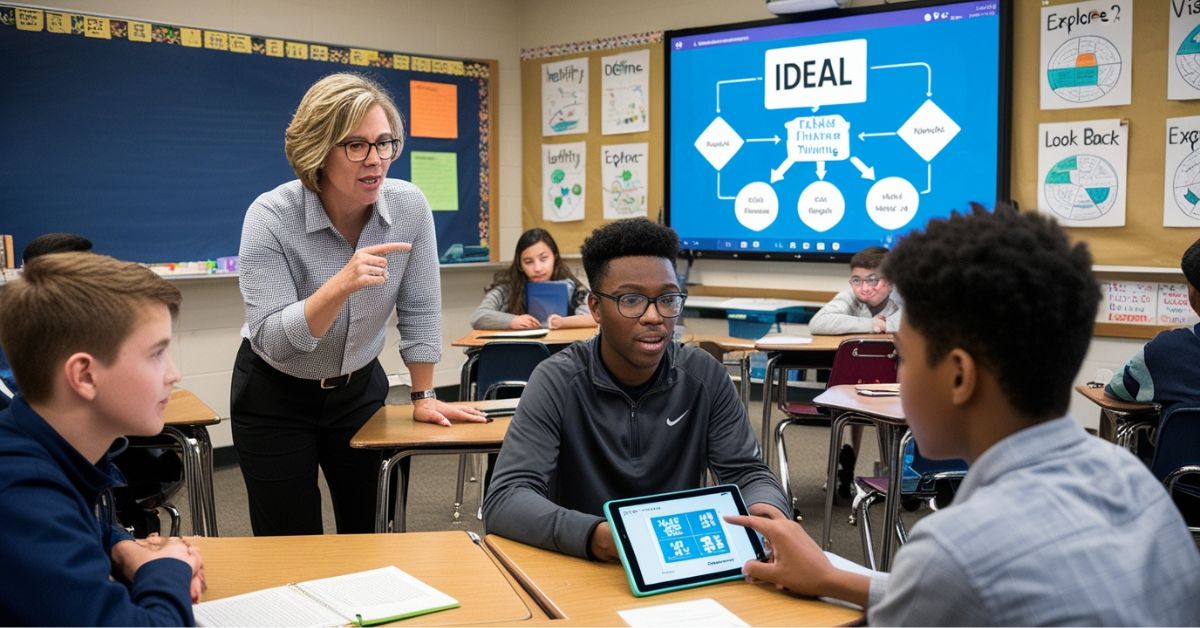Introduction
Teachers are no longer restricted to traditional classrooms in today’s increasingly digital environment. They have access to various digital marketing tools to help them reach a larger audience, improve their professional image, and give essential information to students and colleagues. Teachers now have a unique chance to broaden their effect and build a personal brand using these platforms. This article examines significant digital marketing platforms and how to use social media in education by teachers to improve their professional exposure, build networks, and provide long-term educational value.

Social media networks
Social media channels are the most effective ways for teachers to exchange information, collaborate with colleagues, and engage students innovatively.
- Facebook allows teachers to create educational groups, share lesson ideas, and discuss teaching practices. They can join professional communities to keep up with the latest academic developments.
- Instagram‘s visual nature makes it excellent for sharing classroom activities, highlighting student work, and creating educational infographics.
- LinkedIn is the preferred platform to improve their professional reputation. It enables educators to connect with colleagues, engage in professional debates, and highlight their accomplishments.
YouTube and Video Platforms
Educators have become YouTube content makers, sharing tutorials, lesson explanations, and educational tools with a global audience. Video enables more dynamic and interesting material, which is especially appropriate for topics that benefit from visual examples.
Teachers can create instructional channels focused on specific subjects, submit lesson recordings, and provide homework aids. YouTube also allows students to connect by leaving comments, which allow them to ask questions or clarify their understanding.
Blogs and personal websites

Blogs are effective ways for teachers to spread long-form content. They can create their own blogs to share articles, lesson plans, teaching philosophies, and other educational materials.
Personal websites serve as digital portfolios for instructors to highlight their credentials, accomplishments, and educational philosophy. Platforms such as WordPress, Wix, and Weebly make it simple to construct professional-looking websites without requiring considerable technical knowledge.
Online Course Platforms
Online education has given an opportunity to teachers to build and market their own online courses. As online courses have opened new avenues for educators to create and market their very own courses, with digital learning advancing at a staggering pace, teachers in this space can develop income while sharing their knowledge with thousands of learners across the globe. Several platforms provide the required tools needed to develop, market, and sell effective courses online.
- Udemy allows instructors to create courses on a variety of themes, with freedom in pricing and reach millions of learners online.
- Teachable allows instructors to build branded online schools with the greatest control over branding, pricing, and student engagement.
- Coursera: Offers collaboration with universities and institutions and enables teachers to create professional courses and certifications.
These platforms are there to allow educators to monetize their talent by expanding their reach and feeding into global education. Meeting these platforms provides teachers with a way to deliver structured learning experiences while engaging with students and establishing themselves as subject matter experts in their field.
Email newsletters and educational communities
Research has revealed how significant email marketing can be, and this extremely great technique has always been very helpful for teachers in generating discussions with a specified audience and cementing lifelong relationships: with lists of students, parents, and fellow teachers at their disposal, teachers will be set to pour out their full bags of useful information, from resources to updates and insights. To encourage people to join the list and build up some credibility, offering some free content, like lesson plans, study guides, or an e-book, is a great way to go about this.” Some email marketing programs for teachers:
- Mailchimp—it’s a moderately user-friendly email program; it helps teachers design and automate an email marketing campaign.
- ConvertKit—Perfect for educators wanting to grow their audience with clear and advanced techniques, automation, and segmentation features;
- Substack—A better bet for teachers who want to create and monetize their newsletters by opening up to the option of paid subscriptions.
On top of this, teachers can take to platforms like Reddit and Quora to connect with educational communities, share their expertise, answer questions, and become part of discussions that can help widen and enhance the scope of their influence on the education sector.
Podcasting
Teaching has grown to be one of the most powerful ways of sharing knowledge. The very act of engaging a broader audience to produce meaningful educational content could use a format that is so widely used by the conversational world. Unlike formal teaching, where information is put across in a static way, with podcasts lessons are delivered, discussions are held on various topical issues, and one gets the benefit of insights every now and then, all in an accessible and mobile format for the listener. For example: Explain various educational concepts—teachers build bridges of complex topics into engaging forth and expound a discussion that comes easy to the understanding of all. Interview experts—adding value with different perspectives is ensured by inviting guest speakers such as a subject expert, educator, or industry professional. Provide professional development—teachers offer advice, strategies, and insights to help fellow educators advance in their careers. Strong attractive platforms:
- Anchor—free and easy to use;
- Buzzsprout—a popular hosting service providing a range of statistics, monetization options, and really simple distribution to Spotify, Apple Podcasts, and others.
- Podcasting allows teachers to connect with students, parents, and fellow educators in a flexible way and in an engaging format.
Conclusion
In the recent past, a teacher was always bound within the four walls of a classroom, but in this digital world, the opportunities waiting in digital marketing for an educator are vast and wondrous. Kitchen for creative ways to build their personal brands while enhancing the learning experience for several students: through social media, video platforms, blogging, online courses, a little email marketing, and podcasting, a teacher can build their personal brands while enhancing the learning experience for several students.
Teachers can engage and communicate with audiences and develop themselves as thought leaders thanks to these platforms like Facebook, LinkedIn, YouTube, Udemy, and Mailchimp. These tools help teachers keep abreast of recent developments in various domains of education while giving a platform where teachers can make sustainable money. With education evolving continuously, with an urge to leave behind a legacy, it becomes mandatory for teachers to work with digital platforms. Working on the integration of the tools efficiently can allow educators to build a live, interactive, and globally networked learning experience that benefits students, colleagues, and the entire education community.
You may also like to read:-UNESCO Report: The Impact of Climate Change on Education
How to Understand Your Students: 7 Key Strategies for Teachers
- How to Dominate Your Online Business With 5 Proven Digital Marketing Strategies
- How to Cultivate Critical Thinking and Problem-Solving Skills in Classroom
- Top Proven Mental Health Strategies for Schools in 2025-26
- Time Management for Teachers: How to Plan, Prioritize, and Perform Better
- How Parental Involvement in Education Shapes a Child’s Growth and Success



